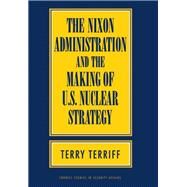The Nixon Administration and the Making of U.S. Nuclear Strategy
, by Terriff, Terry- ISBN: 9780801430824 | 0801430828
- Cover: Hardcover
- Copyright: 6/1/1995
In 1974 Richard Nixon's defense secretary, James Schlesinger, announced that the United States would change its nuclear targeting policy from "assured destruction" to "limited nuclear options." In the first account of the Schlesinger Doctrine to be based on newly declassified documents and extensive interviews with key actors, Terry Terriff challenges the Nixon administration's official explanation of why and how this policy innovation occurred.
According to Terriff, Schlesinger himself argued that "assured destruction," which called for a massive retaliatory nuclear attack to destroy the Soviet Union, could lead to a devastating counterstrike against U.S. cities. The new strategy added a range of limited nuclear options in order to reduce the potential for counterattacks against non-military targets. Schlesinger also stressed that the policy change was necessary because, with the Soviets' achievement of nuclear parity, the American nuclear defense of Western Europe was no longer a credible deterrent.
Terriff concludes that the new targeting policy was influenced by strategic concerns other than those Schlesinger publicly expressed and that it was further shaped by political, budgetary, and technological considerations. The author examines why policymakers believed that targeting practices needed to be revised, what they sought to achieve, and how they went about devising the new policy.
According to Terriff, Schlesinger himself argued that "assured destruction," which called for a massive retaliatory nuclear attack to destroy the Soviet Union, could lead to a devastating counterstrike against U.S. cities. The new strategy added a range of limited nuclear options in order to reduce the potential for counterattacks against non-military targets. Schlesinger also stressed that the policy change was necessary because, with the Soviets' achievement of nuclear parity, the American nuclear defense of Western Europe was no longer a credible deterrent.
Terriff concludes that the new targeting policy was influenced by strategic concerns other than those Schlesinger publicly expressed and that it was further shaped by political, budgetary, and technological considerations. The author examines why policymakers believed that targeting practices needed to be revised, what they sought to achieve, and how they went about devising the new policy.







